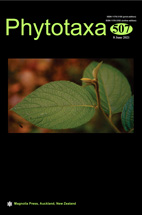Abstract
Eryngium has about 220 species, mostly distributed in subtropical and temperate regions of all continents. With about 60 species, the genus is widely distributed in Brazil, being present in all states of the country. Its species are perennial or biennial plants that preferentially colonize terrestrial, aquatic and rocky substrates. They usually have an erect or creeping habit, with rosulate leaves and white, blue or purple flowers. Within Apiaceae, the genus can be easily distinguished from the other genera by its capitulate inflorescences and by having a single bract per flower. We present the first taxonomic treatment for the genus in the state of Paraná, which is based on herbarium collections and fieldwork across the state. In total, 25 species were recorded. Of these, seven are endemic to Brazil. Eryngium aloifolium and E. regnelli are new records for Paraná. Fifteen species grow in native grasslands at high elevations, whereas one species is restricted to remnants of savannas in the northern portion of the state (E. rochei). Identification key, descriptions, illustrations, distributions maps, and taxonomic comments are provided.

